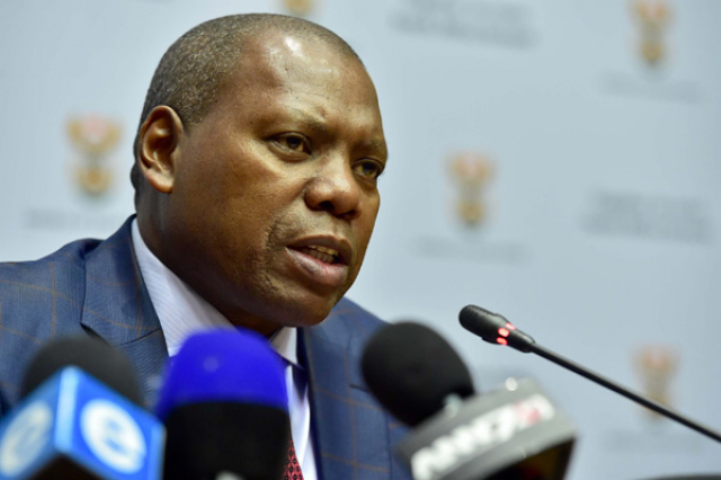Dr Zweli Mkhize addresses on update on COVID-19 and new variant
The Minister said the decrease in infections could be credited to many factors, including enhanced physical distancing facilitated by lockdown regulations.

- Country:
- South Africa
While the country has seen some promising signs of declining new COVID-19 cases compared to the previous week, the second wave continues to put a massive burden on the healthcare system.
This is according to the Health Minister, Dr Zweli Mkhize, who was speaking during the opening address on the update on COVID-19 and the new variant 501.V2 on Monday.
The Minister said the decrease in infections could be credited to many factors, including enhanced physical distancing facilitated by lockdown regulations.
Meanwhile, he found it encouraging that despite the new Coronavirus variant that carries mutations, citizens are still able to protect themselves with the “armour” that government has established.
“We must thank South Africans for adhering to the regulations, difficult and frustrating as it may be. Every sacrifice made has saved lives and we appreciate the patriotism South Africans are displaying to protect the sanctity of life,” he said.
However, Mkhize raised concerns about the healthcare system that continues to see an uptick in COVID-19 patients.
The recent data shows that there has been an 18.3% upward trend on 16 January compared to the last seven days, with close to 18 000 who were admitted, while 2 472 were in the intensive care unit.
Meanwhile, 1 117 of these were on ventilators and 5 850 requiring oxygen.
“This is a significant additional burden to the system.”
He has saluted healthcare workers for their stamina and courage as they continue to battle it out in the forefront.
“We understand the significant risks that you take every day, yet we have witnessed sheer commitment by the professions in health care and a willingness to engage in the pursuit of excellence in health care delivery. We thank you and appreciate you during this extraordinary time.”
Mkhize believes that as the nation that carries 85% of the Southern African Development Community (SADC) region burden, it is incumbent to take leadership in strategies for COVID-19 combat.
He has thanked the local scientists positioning the country as a world leader in genomic surveillance and emergency response.
New variant
COVID-19 Ministerial Advisory Committee Chairperson, Professor Salim Abdool Karim, said one of three tests are coming positive as the country battles the second wave, higher than the first wave.
“This drastic change is largely driven by the virus that certainly biologically looks like it can attach to human cells more efficiently,” he explained.
Meanwhile, according to Karim, the numbers of additional infections are coming down, with the Western Cape and Eastern Cape showing indications of easing off.
“But we’re still in the throes of the second wave,” he added.
The Professor said the daily admissions during the resurgence was more than double than any level during the first wave owing to the new variant.
“We know subjectively, we know it anecdotally, from what we find in our own families and neighbourhoods and now we can see the impact it has overall within the provinces.”
Meanwhile, he said the virus also spreads much faster.
Karim also cited a study that shows that 501.V2 is 50% more transmissible than the previous variants found in South Africa.
Also, in the Western Cape, it travelled 50% faster, taking 54 days to reach 100 000 people compared to 107 days in the first wave.
“In KwaZulu-Natal, it’s 39% faster, it took 54 days in the first wave and 33 days in the second wave,” he explained.
The current studies also indicate that while the virus may be putting pressure in hospitals, it does not cause severe disease, the Professor said.
Is there evidence where the COVID-19 vaccines are effective against this variant?
“I’m so sorry to tell you, not yet,” the Professor said during his presentation.
However, many scientists across the world are working on this, he added.
“We don’t yet have an answer but we’re expecting an answer very soon.
“There’s much to speculate on this, but we want to see actual data but it’s not yet available.”
He is predicting that the vaccine rollout is not going to be easy or quick, but a mammoth logistical task that will need all hands on deck.
“To vaccinate our healthcare workers, elderly, our patients with comorbidities amongst others as soon as we can. That’s our challenge, to make a difference.”
In addition, Karim has assured citizens that the country is looking at vaccines that have a high efficacy rate.
The Health Minister has assured the essential workers that government will provide vaccines.
“The programme will prioritise you, as our frontline workers, from this first quarter of the year. We will then continue to rollout inoculation to all parts of our country during the second quarter onwards. I give you this undertaking – we will not renege on this commitment,” Mkhize vowed.
The Minister has pleaded with citizens as the country gears up for massive inoculation to continue to adhere to the regulations.
“This will be crucial to ensure we can maintain the decline we are observing, which will be threatened by the increased movement of people across provinces and into places of congregation,” he stressed, adding that everyone should play their part and protect one another.
(With Inputs from South African Government Press Release)










